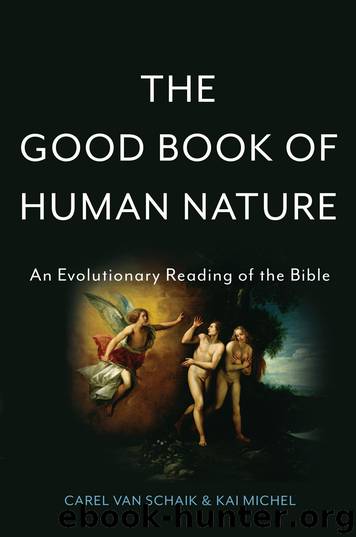The Good Book of Human Nature by Carel van Schaik

Author:Carel van Schaik
Language: eng
Format: epub
ISBN: 9780465098675
Publisher: Basic Books
Published: 2016-04-17T16:00:00+00:00
12
THE PROPHETS
God’s Word from the Mouths of Men
IN THE SECOND MAIN PART OF THE HEBREW BIBLE, THE PROPHETS, NOT the kings, are the true stars. Even its name, Nevi’im (“prophets”), reflects this. As “intermediaries and channels of communication for the divine knowledge,”1 the prophets not only had a direct line to God but also put the kings in their place. The prophet Samuel anointed Saul as king, yet later also told him that he had fallen out of God’s grace: “Because thou hast rejected the word of the LORD, he hath also rejected thee from being king.” The prophet Nathan promised King David his dynasty would reign forever but did not shy away from presaging great ignominy as a result of his dalliance with Bathsheba. The prophet Elijah, for whom Jews open the door during the seder on the first evening of Passover, got into a feud with Ahab, the Israelite king. In the end “the dogs licked up his blood”—Ahab’s blood, that is. And then there is Ezekiel, who denounced the kings in the tone we have come to associate with the prophets of the Old Testament. The kings are “like a roaring lion ravening the prey; they have devoured souls; they have taken the treasure and precious things; they have made her many widows in the midst thereof.” And the princes “are like wolves ravening the prey, to shed blood, and to destroy souls, to get dishonest gain.” It’s easy to see why theologians consider the prophets the “most striking representatives” of Yahweh’s religion.2
The prophets’ prominence is in fact rather curious. The Hebrew word for prophet (navi) means “spokesperson,” and the Greek word prophetes originally referred to “God’s spokesman before the people.”3 The prophets can therefore be seen as the “functional equivalent of pagan magicians, soothsayers, witches, and necromancers.”4 Their chief function is “communicating messages or information from the divine or spirit world to the human world”5—meaning they are undeniably related to the “shamans” and “spirit mediums” of the ancient religions.6 But had not monotheism declared open season on such hocus-pocus?
The end of the Torah is quite clear. The revelation was complete: the prophet Moses died and was replaced by the law. That a future prophet could come along and correct the word of God was unthinkable. Nevertheless, the Torah appears to leave the back door cracked open for the prophets’ return when it states, “And there arose not a prophet since in Israel like unto Moses, whom the LORD knew face to face.” Although no other prophets came forth who matched Moses in stature, they did not disappear altogether. This truly is strange. What were they needed for? In the context of the intellectual-institutional religion surrounding Yahweh—a rational, rule-based catastrophe-prevention system based on the one and only God well on his way to transcendence—the idea that we needed individual prophets to help us decode God’s message was simply preposterous. We have the law! We just have to study it. Why, then, are the stories following in the
Download
This site does not store any files on its server. We only index and link to content provided by other sites. Please contact the content providers to delete copyright contents if any and email us, we'll remove relevant links or contents immediately.
Sapiens: A Brief History of Humankind by Yuval Noah Harari(14389)
Sapiens by Yuval Noah Harari(5372)
Pale Blue Dot by Carl Sagan(5009)
Homo Deus: A Brief History of Tomorrow by Yuval Noah Harari(4918)
Livewired by David Eagleman(3775)
Origin Story: A Big History of Everything by David Christian(3692)
Brief Answers to the Big Questions by Stephen Hawking(3435)
Inferior by Angela Saini(3316)
Origin Story by David Christian(3202)
Signature in the Cell: DNA and the Evidence for Intelligent Design by Stephen C. Meyer(3138)
The Gene: An Intimate History by Siddhartha Mukherjee(3098)
The Evolution of Beauty by Richard O. Prum(2997)
Aliens by Jim Al-Khalili(2830)
How The Mind Works by Steven Pinker(2816)
A Short History of Nearly Everything by Bryson Bill(2698)
Sex at Dawn: The Prehistoric Origins of Modern Sexuality by Ryan Christopher(2529)
From Bacteria to Bach and Back by Daniel C. Dennett(2485)
Endless Forms Most Beautiful by Sean B. Carroll(2483)
Who We Are and How We Got Here by David Reich(2437)
